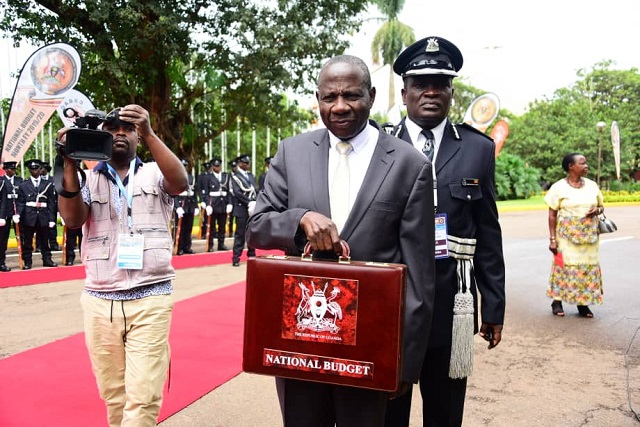
Industry rising
The new statistics give an array of data previously unseen. In agriculture, for example, there is new data on the usual sectors like coffee, cotton, forestry, and fishing. Now, however, there is updated data on sugarcane, flowers, vanilla, and even sweet potatoes and cassava. On livestock, there is new data on pigs, chicken, goats and even sheep which are doing surprisingly very well.
But one of the most significant outcomes of the rebasing of GDP is a new structure of the economy showing an emerging industrial sector.
In the FY 2019/20 budget speech, Finance Minister Matia Kasaija captured the changing structure of the economy. However, his figures appear to have been conservative. He said the share of industry in the economy is now 21% compared to 11.3% in 1986.
The revised figures show that industry contributes 26% to GDP. This is significant because the services, previously estimated to contribute 48.7% actually does 43.5% and agriculture which was previously estimated to bring 22% in financial year 2018/19 is at 23.5% in the revised Supply and Use (SUT) of the economy.
The revised figures show that while manufacturing in FY 2018/19 was estimated to contribute just Shs9 trillion to GDP, in actually contributes Shs20 trillion. That is an 81% jump. Mining and quarrying was estimated to contribute only Shs545 billion but it actually contributes Shs1.8 trillion. There is data on electricity supply, water, transport, trade, real estate and even household work.
Accurate data
During rebasing, the revised figures are usually higher than the earlier published on because rebasing of GDP usually involves data giving better coverage of the economy, new weights for sectors to reflect their contributions to the economy, and sometimes better data compilation technology. The African Development Bank and others recommend that nations rebase their GDPs calculations every five year. The longer the period before rebasing the bigger the difference is after revision.
At the launch, Mukiza said the new “SUT is more robust compared to the previous SUTs due to further improvements in the compilation system and improved scope of data sources”.
When Uganda rebased its GDP figures in 2014 the size of the economy jumped by 17%. Kenya and Tanzania which rebased at around the same time saw jumps of 24% and 25% respectively. Nigeria and Ghana saw ever higher jumps of 89% and 62% respectively because they were rebasing after at least 24 years while Uganda was about nine years. In the case of Nigeria, that it overtook South Africa as the biggest economy on the African continent.
According to Mukiza, UBOS plans to revise the economic figures every five years for statistical accuracy. The latest rebasing comes after seven years. But Mukiza says the next rebase will be in 2021/22 and preparations will start with the Business Inquiry and Livestock Census this financial year, the Crop Census in 2020 and the National Population and Housing Census in 2022.
Better living standards
Based on the rebased figures, the GDP per capita in the latest figures of 2018/19 is Shs3.3 million. This is what, the experts estimate, each Ugandan averagely produces or earns in money terms per years. It had risen from Shs1.8 million in 2009/2010 in the revised figures.
Economists believe that GDP per capita figures are a good indicator of standards of living. The new figures mean that the standard of living of each Ugandan has gone up by 83% since 2009. This means that, basing on the new figures, Ugandan should be feeling that the country is getting richer – even if they individually are not getting richer for various reasons, including inequitable distribution of wealth.
In U.S. dollar terms and at constant 2009/10 prices, the GDP per capita is today US$798. But under the revised series at 2017/18 the GDP per capita is U.S$934. That is higher than the US$825 announced in the latest national budget estimates.
This does not mean that each Ugandan can suddenly afford goods and services they did not afford before the UBOS announcement. Many things will remain the same, including salaries, prices, and the number of chickens or goats on your farm.
 The Independent Uganda: You get the Truth we Pay the Price
The Independent Uganda: You get the Truth we Pay the Price



